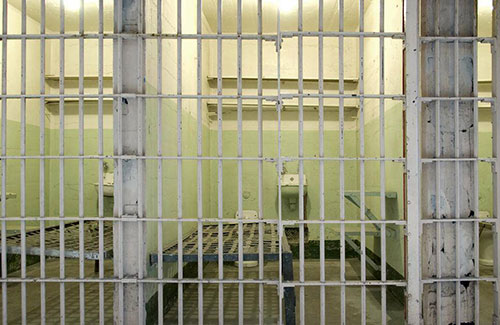日本监狱成老年女性天堂!原因竟然是...
中国日报网 2018-04-28 15:14

天堂,这个象征美好世界的词汇,大部分人都不会把它与监狱相提并论。但是在日本,监狱却成了老年女性的天堂。这究竟是什么原因呢?

Japan has the oldest population in the world, with at least 27 percent being over the age of 65. Yet the country is facing an unprecedented problem.
日本是世界上人口老龄化程度最高的国家,至少有27%的人口年龄在65岁以上。而这个国家正面临着前所未有的问题。
A report from Bloomberg states that at least one in five women in Japanese prisons is a senior citizen, with at least nine out of ten of them committing minor offences like shoplifting.
据彭博社报道,日本监狱里每五名女性中至少有一人是老年人。她们所犯罪行九成以上都是小偷小摸之类的轻罪。
日本的犯罪率在发达国家中相对较低,但唯有老年人这个群体,犯罪数量却在逐年增加。随着老龄化的加剧,老年犯罪在日本逐渐成为一个严重的社会问题。
Between 1980 and 2015, the number of elderly people living by themselves in Japan increased more than sixfold to nearly 6 million.
1980年至2015年期间,日本独居老人数量增加了6倍多,达近600万人。
In 2017, a Tokyo government survey found that more than 50 percent of seniors who shoplifted lived alone and 40 percent didn't have a family or relative to turn to.
2017年,东京政府的一份调查发现,一半以上的老年偷窃者独自生活,而四成老年偷窃者没有家人或亲属可以依靠。
For decades prior to this trend, it was a tradition for families and communities to care for their older citizens, but a lack of resources is making that harder to do so.
在出现这种趋势以前,日本多年来的传统是由家庭和社区照顾老人,但资源不足导致这一传统更难维系了。
With the older population feeling more and more isolated as a result of this, women especially have turned to a life of crime in the hope that prison will provide them with a refuge and a home.
于是越来越孤独的老年人群,尤其是女性,走上犯罪道路,希望监狱为她们提供一个避风港和家。
Yumi Muranaka, head warden of Iwakuni Women's Prison, near Hiroshima, told Bloomberg:
村中由美(音译)是广岛附近的岩国女子监狱狱长,她告诉彭博社:
They may have a house. They may have a family. But that doesn't mean they have a place they feel at home.
这些人可能有房子有家。但是这并不意味着她们能找到家的感觉。
They feel they are not understood. They feel they are only recognized as someone who gets the house chores done.
她们觉得自己不被理解,认为自己只是被当作保姆。
Elderly women, more so than men, are also considered to be more economically vulnerable, with nearly half of the female population over 65 living in poverty.
与老年男性相比,老年女性的经济能力也被认为更脆弱,65岁以上的女性人群中近一半生活贫困。
Prison has provided these women with a chance to escape their domestic lives. Bloomberg spoke to several inmates with one, simply known as Ms. T, giving a particularly harrowing account of how her life deteriorated.
监狱为这些女性提供了一个逃离家庭生活的机会。彭博社采访了几名犯人,一名被称为T女士的犯人极其悲惨地讲述了她的生活是如何越来越糟的。
The 80-year-old is quoted as saying:
这位80岁的老人称:
My husband had a stroke six years ago and has been bedridden ever since. He also has dementia and suffers from delusions and paranoia.
我丈夫6年前中风后卧床不起。他还患有老年痴呆,经常出现错觉且偏执多疑。
It was a lot to take care of him physically and emotionally because of my old age. But I couldn't talk about my stress with anyone because I was ashamed.
我的年纪也大了,照顾他让我身心俱疲,但我又耻于向其他人倾诉我的压力。
I was imprisoned for the first time when I was 70. When I shoplifted, I had money in my wallet. Then I thought about my life.
我第一次入狱是70岁。我在商店偷窃时,钱包里还有钱。然后我开始思考人生。
I didn't want to go home, and I had nowhere else to go. Asking for help in prison was the only way.
我不想回家,但我也无处可去。向监狱寻求帮助是我唯一的选择。
My life is much easier in prison. I can be myself and breathe, however temporarily.
在监狱里,我的生活好过多了。尽管是暂时的,但我能松下一口气来做自己。
My son tells me I’m ill and I should be hospitalized in a mental institution and take it easy. But I don’t think I’m ill. I think my anxiety drove me to steal.
我儿子说我病了,应该住进精神病院,劝我看开点。但我并不感觉自己病了。我认为是焦虑促使我偷窃。
While in prison the women are assigned a specialist worker who will assist them with bathing and toilet tasks during the day, yet at night these duties are handled by guards.
在监狱里,白天有一名专门的护工照顾这些女性洗浴、上厕所,但到了晚上,这些活就落到狱警身上。
For some of these correctional officers, their day-to-day jobs are now closer to that of a nursing home attendant, with some having to deal with issues like incontinence.
对一些狱警来说,如今,他们的日常工作更近乎于疗养院护工,有些人不得不处理失禁之类的问题。
Satomi Kezuka, an officer at Tochigi Women's Prison, added:
枥木女子监狱的狱警毛冢里美(音译)称:
They [the women] are ashamed and hide their underwear.
她们感到羞耻,把内裤藏起来。
I tell them to bring it to me, and I will have it washed.
我让她们拿给我,我会把内裤洗干净。
Yet, this extra work creates further problems. Care for elderly prisoners saw medical costs in prisons pass the 6 billion yen mark in 2015, which is an 80 percent increase since 2005.
但是,这些额外的工作制造了更多问题。因为要照顾老年囚犯,日本监狱2015年的医疗开销超过60亿日元(约合人民币3.5亿元),比2005年上涨了80%。
Furthermore, more than a third of female correctional officers quit their jobs within three years, leading to an obvious shortage of staff.
此外,三年内,超过三分之一的女性狱警纷纷辞职,导致监狱工作明显人手不足。
In 2016, a law was passed that would ensure that an ex-convict would receive help from Japan's welfare and social service systems.
2016年,日本国会通过一项法律,确保前科犯能够得到国家福利和社会服务机构的帮助。
In addition to this, prosecution offices and prisons are working with government agencies in order to help the women who find themselves in this unfortunate situation.
除此之外,地检部门和监狱与政府机构合作,以帮助这些生活不幸的女性。
英文来源:indy100
编译:董静
审校:yaning

















 英语点津微信
英语点津微信 双语小程序
双语小程序